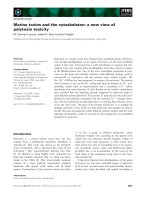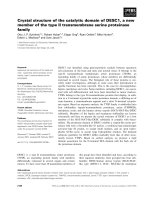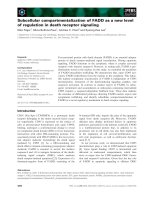A new record of Polistella (Polistes) species (Hymenoptera: Vespidae: Polistinae) with its nest description from Tay Nguyen plateau, Vietnam
Bạn đang xem bản rút gọn của tài liệu. Xem và tải ngay bản đầy đủ của tài liệu tại đây (509.48 KB, 5 trang )
SINH
HOC 2014,
36(4): 423-427
ATAP
newCHI
record
of Polistella
(Polistes)
species
DOI:
10.15625/0866-7160/v36n4.6172
DOI: 10.15625/0866-7160.2014-X
A NEW RECORD OF Polistella (Polistes) SPECIES
(Hymenoptera: Vespidae: Polistinae) WITH ITS NEST DESCRIPTION
FROM TAY NGUYEN PLATEAU, VIETNAM
Nguyen Thi Phuong Lien
Institute of Ecology and Biological Resources, VAST, *
ABSTRACT: One social wasp species of subgenus Polistella of the genus Polistes (Hymenoptera:
Vespidae: Polistinae), Polistes meadeanus (von Schulthess), is recorded from Tay Nguyen plateau
of Vietnam for the first time. This species can be distinguished from all other known species of
subgenus Polistella from Vietnam by the metasomal tergum I distinctly longer than its apical width
(1.4:1), and petiole of the nest is central, not terminal like almost other Polistella species. Nest
structure of the species is also described in detail. Figures of female, male and nest are presented.
The reported distribution areas of the species are confined to southern parts of the Southeast Asia,
or Sundaland and the southeastern part of Indochina, and in this paper it is recorded from mainland
for the first time. This record gives a great contribution to our knowledge on the distribution of the
species, and supports to the hypothesis of the origin of the species, its origin is possibly in
Sundaland with subsequent northward dispersal to Vietnam, but the Indochina origins and
subsequent southward dispersal is not rejected.
Keywords: Vespidae, Polistes, Polistella, nest description, new record, Tay Nguyen, Vietnam.
INTRODUCTION
Among three Old World subgenera of the
genus Polistes, namely Gyrostoma Kirby &
Spence, 1828, Polistella Ashmead, 1904, and
Polistes, Latreille 1802, Polistella, with 85 valid
species, is the largest in terms of the number of
species and most widely distributed, occurring
in most parts of the Old World except in
Europe, Mediterranean Africa and the Arabian
Peninsula [1, 2]. In Vietnam, faunal studies on
Polistella wasps carried out since 2005 include
Nguyen et al. (2005a,b) [3, 4], Nguyen et al.
(2007a,b) [5], Nguyen & Ta (2008) [7], Nguyen
& Pham (2011) [8] and Nguyen & Kojima
(2014) [9]. As a result of this work 23 species of
Polistella have been recorded, comprising about
one-fourth of Polistella species in the world; it
shows a great species diversity in Vietnam.
Of the Polistella species, Polistes
meadeanus (von Schulthess) was recorded from
Malaysia (including Sabah, Sarawak) and
Kalimantan of Indonesia [12]. Those places are
peninsular and islands in southern part of South
East Asia. None of the specimens was collected
further north on the mainland before. In this
paper, the species is recorded from Tay Nguyen
plateau of Vietnam for the first time. Nest
structure of the species is also described. This
record greatly extends our knowledge of the
distribution, and helps us to understand the
origin of the species.
MATERIALS AND METHODS
The material examined in the present study
is those specimens deposited in the collections
of the IEBR.
The parts measured for the morphometric
characters referred to in the descriptions are
defined as follows: body length, the lengths of
head, mesosoma and first two metasomal
segments combined; the length of metasomal
tergum 1, the distance in lateral view from the
posterior end of the basal slit for the reception
of the propodeal suspensory ligament to the
posterodorsal end of the tergum.
The
nest
characters,
including
measurements of various parts given below,
were examined after the immatures had been
taken out and the nests had been air-dried. The
length and thickness (minimum and maximum
thicknesses at the mid-length) of a nest pedicel
and the distance between opposite sides of a cell
containing a pupa or having the trace of a
cocoon cap (“cell width”) were measured to the
423
Nguyen Thi Phuong Lien
nearest 0.1 mm with vernier calipers. The
thickness of cell wall was taken with a
micrometer to the nearest 0.01 mm. The
terminology of nest characters follows Wenzel
(1998) [13]. In the description of nest comb
shapes, “ventral” and “dorsal” refer to the
directions corresponding to cell openings and
cell bottoms, respectively.
Photographic images were made with the
Leica EZ4HD 3.0 MegaPixel Digital Stereo
Microscope, using LAS exclusive microscopy
software (LAS EZ 2.0.0); the plates were
finished with Photoshop CS6.
RESULTS AND DISCUSSION
Polistes meadeanus (von Schulthess, 1913)
Parapolybia meadeana von Schulthess,
1913, Mitt. Schweiz. Entomol. Ges. 12: 161,
female, male-“Kina Balu, Borneo, Perak,
Sarawak” (London).
Polybia andrei du Buysson, 1913, Bull.
Soc. Entomol. France 1913: 296, male“Malacca: Pérak” (Paris).
Polybia shelfordi du Buysson, 1913, Bull.
Soc. Entomol. France 1913: 297, female“Kuching (Borneo)” (Oxford).
Material examined. 3 females, 1 male, Kon
Ka Kinh NP, Mang Yang, Gia Lai, 14°11'N,
108°17'E, alt. 700 m, Nest#TN-2012-P-01,
13.vii.2012, NTP Lien; 7 females, 6 males, Kon
Ka Kinh NP, K Bang, Kon Pne, Gia Lai,
14°23'N, 108°20'E, alt. 847 m, Nest#TN-2012P-02, 17.vii.2012, NTP Lien.
Diagnosis.
This
species
can
be
distinguished from all other known species of
the subgenus Polistella from Vietnam by the
following combination of characters: metasomal
tergum I distinctly longer than its apical width
(1.4:1), and the petiole of the nest is central, not
terminal like almost all other Polistella species.
The female and male structures of Polistes
meadeanus were described in detail by
Schulthess (1913) [11]. The female and male
specimens we examined agreed well with the
description by Schulthess (1913) [11] and
Kojima et al. (unpublished) while the body sizes
are slightly smaller than those described by
424
Schulthess and Kojima.
Female (fig. 1-3). Body length about 9.511mm, fore wing length about 11-12.5 mm
Male (fig. 4-6). Body length about 8.510mm, fore wing length about 10-11.5 mm
The nest Nest#TN-2012-P-01 (fig. 7) was
collected together with three females. The nest
was attached to a broad leaf, at about 2.5 m
above the ground, and has 22 cells, with three
pupae, without eggs. One male emerged later
when the nest was being kept in a nylon bag.
The Nest#TN-2012-P-02 (Fig. 8) was collected
with seven adult female wasps; 6 males were
emerged later. The nest was attached to a long
and thin leaf, at about 2 m above the ground,
and has 57 cells, with seven pupae. The
structural and morphological characters are as
follows: Comb tough, pliable “paper”-like in
texture, more or less uniformly gray in cell wall,
subcircular (about 19 mm × 16 mm for Nest
Nest#TN-2012-P-01 and about 29 mm × 27 mm
for Nest#TN-2012-P-02) in view from side of
cell opening, expanded concentrically from the
single petiole, with surface corresponding to
cell bottom slightly convex. The nest Nest#TN2012-P-01 has petiole single, central, attached
to the border between bottoms of the first three
cells, 3.9 mm long and 0.6 × 0.9 mm thick at
the mid-length, with thin central core of plant
fibers, enlarged strictly with adult oral
secretion, dark brown and lustrous, secretion
coat expanded on comb back around the petiole
and on substrate in about 2 mm × 3 mm thin
film. The petiole of the nest Nest#TN-2012-P02 was lost while collecting, but was situated
near the center of comb, first two cells having
been constructed on its tip. Cells are generally
arranged in regular rows, pentagonal at open
end when surrounded by other cells, with free
margins rounded; for the nest Nest#TN-2012-P01 each cell expanded towards open end, 4.2
mm (range 3.8-4.6 mm; n=7) wide at open end,
2.3 mm (range 1.8-2.7 mm; n=7) wide at
bottom and 12.3 (range 10.8-13.5 mm; n=7)
mm deep in full grown cells, cell wall about
0.07 mm thick; for the nest Nest#TN-2012-P02, each cell expanded towards open end 4.0
mm (range 3.7-4.4 mm; n=10) wide at open
A new record of Polistella (Polistes) species
end, 2.7 mm (range 2.5-3.0 mm; n=10) wide at
bottom and 11.8 (range 10.6-13 mm; n=10) mm
deep in full grown cells, cell wall about 0.9 mm
thick. Cocoon caps greenish-yellow in nature,
weathered with time to become pale yellow,
produced beyond rim of cell by 0.5-3 mm,
slightly domed.
Distribution. Malaysia (including Sabah,
Sarawak); Indonesia: Kalimantan; Vietnam
(NEW RECORD): Kon Tum, Dak Lak.
Figures 1-8. Polistes (Polistella)
meadeanus. 1-3, female. 1. Head in
frontal view, 2. Right antenna, 3.
Habitus. 4-6, male. 4. Head in frontal
view, 5. Right antenna, 6. Habitus. 7, 8.
Nests.
In Vietnam, Polistes meadeanus is recorded
only from Tay Nguyen plateau in the southern
part of the country. The reported distribution
areas of the species are confined to southern
parts of the Southeast Asia, or Sundaland and
the southeastern part of Indochina. Its origin is
possibly in Sundaland with subsequent
northward dispersal to Vietnam; but Indochina
origins and subsequent southward dispersal
cannot be rejected.
Acknowledgments: I would like to thank
James M. Carpenter for his comments and
425
Nguyen Thi Phuong Lien
English proofreading on the MS. The present
study was supported by the grant from the
Vietnam National Foundation for Science and
Technology Development (NAFOSTED: no.
106-NN.05-2014.40) to the author.
REFERENCES
1. Carpenter J. M., 1996a. Phylogeny and
biogeography of Polistes. In: Turillazzi, S.
& West-Eberhard, M. J. (Eds.), Natural History and Evolution of Paper-Wasps. Oxford
University Press, Oxford, pp. 18-57.
2. Carpenter J. M., 1996b. Distributional
checklist of species of the genus Polistes
(Hymenoptera:
Vespidae;
Polistinae,
Polistini). American Museum Novitates,
3188: 1-39.
3. Nguyen T. P. Lien, Kojima J. & Saito F.,
2005a.
Survey
of
social
wasps
(Hymenoptera: Vespidae) in Xuan Son and
Cat Ba National Parks. Proceedings of the
National Conference on Life Sciences,
Hanoi Medical University. Agricultural
Publishing House, Hanoi:
218-220.
(Vietnamese, summary in English).
4. Nguyen T. P. Lien, Saito F., Kojima J.,
Carpenter J. M., 2005b. An annotated
distributional checklist of social wasps
(Hymenoptera: Vespidae) of Viet Nam.
Proceedings of the 1st national workshop on
ecology
and
biological
resources.
Agricultural Publishing House, Hanoi: 129137 (Vietnamese, summary in English).
5. Nguyen T. P. Lien, Saito F., Kojima J., 2007.
Species composition and distributional
pattern of social wasps (Hymenoptera:
Vespidae) in relation to altitude in Bach Ma
National Park. Proceedings of the 2nd
National Scientific Conference on Ecology
and Biological Resources. Agricultural
Publishing
House,
Hanoi:
411-414.
(Vietnamese, summary in English).
6. Nguyen T. P. Lien, Khuat D. Long, Do V.
Lap, Luong V. Hao, 2007. Survey of bees
and wasps (Hymenoptera) in Cuc Phuong
National Park. Proceedings of the 2nd
426
National Scientific Conference on Ecology
and Biological Resources. Agricultural
Publishing House, Hanoi: 415-419.
(Vietnamese, summary in English).
7. Nguyen T. P. Lien, Ta H. Thinh, 2008.
Survey of social wasps (Hymenoptera:
Vespidae) in Truong Son range, which
belong to Quang Binh, Quang Tri, Thua
Thien Hue and Quang Nam Provinces.
Proceedings of the 6th Vietnam National
Conference on Entomology. Agricultural
Publishing House, Hanoi: 964-968.
(Vietnamese, summary in English).
8. Nguyen T. P. Lien, Pham H. Phong, 2011.
Study of social wasps (Hymenoptera:
Vespidae) in some natural reserves in
northwestern Vietnam. Proceedings of the
6th Vietnam National Conference on
Entomology.
Agricultural
Publishing
House, Hanoi: 848-851 (Vietnamese,
summary in English).
9. Nguyen L. T. P., Kojima J., 2014.
Distribution and nests of paper wasps of
Polistes (Polistella) in northeastern
Vietnam, with description of a new species
(Hymenoptera,
Vespidae,
Polistinae).
Zookeys, 368: 45-63.
10. Nguyen L. T. P., Kojima J., Saito F., 2011.
Polistes (Polistella) wasps (Hymenoptera:
Vespidae: Polistinae) from mountainous
areas of northern Vietnam, with description
of five new species. Zootaxa, 3060: 1-30.
11. Schulthess A. von., 1913. Parapolybia
Saussure Vespidae sociales. Mitteilungen
der
Schweizrischen
Entomologischen
Gesellschaft, 12: 161-162, pls. 2, 12 and 13.
12. Vecht J. van der., 1966. The East-Asiatic
and Indo-Australian Species of Polybioides
Buysson and Parapolybia Saussure (Hym.,
Vespidae). Zoologische Verhandelingen,
Leiden, 82: 3-42.
13. Wenzel J. W., 1998. A generic key to the
nests of hornets, yellowjackets, and paper
wasps worldwide (Vespidae: Vespinae,
Polistinae). American Museum Novitates
3224: 1-39.
A new record of Polistella (Polistes) species
GHI NHẬN MỚI VỀ MỘT LOÀI ONG BẮT MỒI THUỘC PHÂN GIỐNG Polistella
(Polistes) (Hymenoptera: Vespidae: Polistinae) VÀ CẤU TRÚC TỔ CỦA LOÀI NÀY
Ở KHU VỰC TÂY NGUYÊN, VIỆT NAM
Nguyễn Thị Phương Liên
Viện Sinh thái và Tài nguyên sinh vật, Viện Hàn lâm KH & CN Việt Nam
TÓM TẮT
Phân bố của loài ong bắt mồi Polistes meadeanus thuộc phân giống Polistella của giống Polistes
(Hymenoptera: Vespidae) ở Tây Nguyên lần đầu tiên đã được ghi nhận cho khu hệ các loài ong xã hội bắt
mồi thuộc họ Ong vàng ở Việt Nam. Loài này có các đặc điểm khác so với các loài thuộc phân giống này ở
Việt Nam đốt bụng thứ nhất dài hơn chiều rộng rõ rệt (1,4:1) và cuống tổ nằm ở trung tâm chứ không nằm
lệch về một phía như cuống tổ của các loài khác thuộc cùng phân giống. Tổ của loài này cũng được mô tả chi
tiết trong bài báo. Trước đây loài này chỉ được ghi nhận ở các vùng đảo và bán đảo phía nam của khu vực
Đông Nam châu Á, lần đầu tiên loài này được ghi nhận ở Việt Nam cũng là ghi nhận ở đất liền. Ghi nhận này
đóng góp một phần cho những hiểu biết về phân bố của loài này trên thế giới. Cùng với những ghi nhận về
phân bố của loài trước đây ở Inđônêxia và Malayxia, hai giả thuyết được đưa ra, đó là Sundaland có thể là
trung tâm phát sinh của loài này và sau đó chúng phát tán về phía Bắc đến Việt Nam, còn một giả thuyết khác
cũng được xem xét đó là loài này có trung tâm phát sinh ở khu vực Đông Dương và từ đây chúng phát tán đến
các bán đảo và các đảo ở phía nam.
Từ khóa: Vespidae, Polistes, Polistella, ghi nhận mới, cấu trúc tổ, Tây Nguyên, Việt Nam.
Ngày nhận bài: 29-10-2014
427









